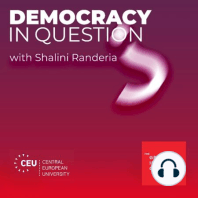26 min listen

Language and public discourse in the success of right-wing political movements
Language and public discourse in the success of right-wing political movements
ratings:
Length:
30 minutes
Released:
Sep 29, 2021
Format:
Podcast episode
Description
Democracy in Question? is brought to you by:• Central European University: CEU• The Albert Hirschman Centre on Democracy in Geneva: AHCD• The Podcast Company: Novel Follow us on social media!• Central European University: @CEU• Albert Hirschman Centre on Democracy in Geneva: @AHDCentreSubscribe to the show. If you enjoyed what you listened to, you can support us by leaving a review and sharing our podcast in your networks! BIBLIOGRAPHY Politics of Fear: What Right-Wing Populist Discourses Mean by Ruth Wodak (2015) Methods of Critical Discourse Studies by Ruth Wodak and Michael Meyer (2015) The Routledge Handbook of Language and Politics by Ruth Wodak and Bernhard Forchtner (2017) Österreichische Identitäten im Wandel:Empirische Untersuchungen zu ihrer diskursiven Konstruktion1995-2015 (German Edition) by Rudolf de Cillia, Ruth Wodak, Markus Rheindorf and Sabine Lehner (2020)The Politics of Fear: The shameless normalization of far-right populist discourses (Second Edition) by Ruth Wodak (2020) GLOSSARY What is “Right-wing Populist Perpetuum Mobile”?(00:3:56 or p.1 in the transcript) Theory that refers to the strong interdependence between media and parties, where media (and politicians) fall into the traps set by right-wing parties in the form of discursive strategies of provocation, exaggeration and scandalization, helping these parties to frame the agenda and appear on the front page in the news. SourceWho was Jörg Haider? (00:4:02 or p.1 in the transcript) Controversial Austrian politician, a charismatic and a skillful orator, who served as leader of the far-right Freedom Party of Austria (1986–2000) and Alliance for the Future of Austria (2005–08) and as governor of the Bundesland (Federal State) of Kärnten (1989–91; 1999–2008).Haider virulently denounced immigration and opposed the expansion of the European Union to the east—positions that were applauded by a wide spectrum of Austrians. Particularly controversial were the number of statements he made about Hitler and the Nazis. SourceWhat is Austrian Freedom Party (Freiheitliche Partei Österreich or FPÖ)?(00:4:11 or p.1 in the transcript) The populist Freedom Party of Austria, sometimes referred to as the Liberal Party, was founded in 1955 as a successor to the League of Independents. Initially drawing the bulk of its support from former National Socialists, the party’s fiercely right-wing views had been largely moderated by the 1980s, and it participated in a coalition government with the SPÖ. In the late 1980s that ideological swing was reversed party leader Jörg Haider, who brought the FPÖ unprecedented electoral success with a Euroskeptic platform that capitalized on anti-immigrant and anti-Muslim sentiment. An internecine feud in 2005 caused Haider to leave the FPÖ and form a new party, the Alliance for the Future of Austria (Bündnis Zukunft Österreich; BZÖ). While the FPÖ remained a significant, if controversial, force in national politics in the 21st century, electoral support for the BZÖ declined greatly after Haider’s death in 2008. Source What is Fridays for Future? (00:24:30 or p.4 in the transcript) Fridays for Future (or FFF) is a youth-led and -organized, independent global climate strike movement that started in August 2018, when 15-year-old Greta Thunberg began a school strike for climate, sitting outside the Swedish Parliament every school day, demanding urgent action on the climate crisis. The goal of the movement is to put moral pressure on policymakers, to make them listen to the scientists and take actions to limit global warming. Source
Released:
Sep 29, 2021
Format:
Podcast episode
Titles in the series (77)
Can and should Western style democracy be exported far and wide? by Democracy in Question?